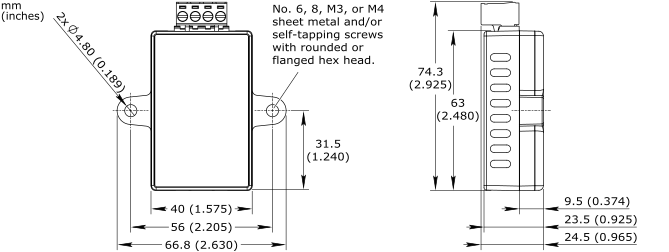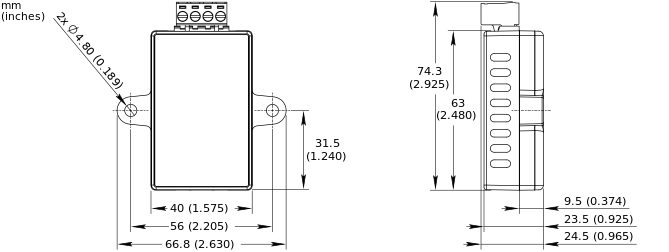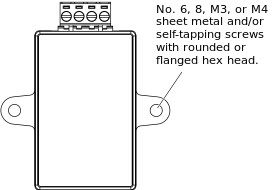The Non-isolated RS-485 Adapter (SXWNISORS48510001) is used when connecting an RP or MP controller to the following networks:
action_zoom_plus_stroke

Figure:
Non-isolated RS-485 Adapter
The adapter converts the controller RS-485 Com port RJ45 interface to screw terminals, which is required to be able to connect the controller to a BACnet MS/TP or Modbus RTU subnetwork.
A separate connection cable is required to connect the adapter to the controller. The cable is not included and needs to be purchased separately.
BACnet MS/TP network including non-isolated controllers
The Non-isolated RS-485 Adapter is used when connecting an IP based RP or MP controller (BACnet/IP controller) to a BACnet MS/TP network that includes non-isolated controllers, such as the b3 BACnet family of zone controllers.
The adapter can be used with BACnet/IP controller models that support reconfiguration for BACnet MS/TP communication.
For more information, see SpaceLogic RS-485 Adapters
.
The BACnet/IP controller needs to be reconfigured to communicate with automation servers based on the BACnet MS/TP protocol, instead of the BACnet/IP protocol.
For more information, see Allocating Flexible Ports
.
Modbus RTU subnetwork including Modbus devices
The Non-isolated RS-485 Adapter is used when connecting an RP or MP controller to a Modbus RTU subnetwork that includes Modbus devices that are non-isolated or isolated.
The adapter can be used with RP and MP controller models that support Modbus RTU communication.
For more information, see SpaceLogic RS-485 Adapters
.
One of the controller's RS-485 port(s) needs to be configured for Modbus RTU communication.
For more information, see Allocating Flexible Ports
.
RS-485 Adapter Device Installation
The RS-485 adapter has a protruding bracket on each long side with a mounting hole to facilitate installation of the device with two screws (not included). The device can also be fastened using cable ties or mounted in line with a cable run. The RS-485 adapter is suitable for plenum use.
For more information, see Installing an RS-485 Adapter
.
Non-isolated RS-485 Adapter Connection and Wiring
The Non-isolated RS-485 Adapter is equipped with an RJ45 port for connection to an RP or MP controller RS-485 Com port and a 4-position removable screw terminal block for connection to a BACnet MS/TP (RS-485) network or Modbus RTU (RS-485) subnetwork.
For more information, see Non-isolated RS-485 Adapter Connection and Wiring
.
Specifications
| Electrical |
DC input supply voltage
|
0 V
|
Maximum power consumption
|
0 W
|
| Environment |
Ambient temperature, operating
|
0 to 50 °C (32 to 122 °F)
|
Ambient temperature, storage
|
-40 to +70 °C (-40 to +158 °F)
|
Humidity
|
Maximum 95 % RH non-condensing
|
| Material |
Plastic flame rating
|
UL94 V-0
|
Plenum rating
|
UL 2043
|
Ingress protection rating
|
IP 20
|
| Mechanical |
Dimensions
|
See drawing below
|
action_zoom_plus_stroke

|
Weight
|
40 g (1.41 oz)
|
Installation
|
Connection to RS-485 Com A or Com B via Cat 5 UTP cable (not included)
a
|
Installation options
|
The adapter can be fastened using screws or cable ties or mounted in line with a cable run.
a
|
|
|
Approved for plenum installation (UL 2043)
|
Maximum Cat 5 UTP cable length
|
0.3 m (12 inches)
|
| The Cat 5 UTP cable is not included.
|
| Hardware |
Connectors
|
RS-485, 4-pole removable screw terminal block
|
|
|
RS-485, RJ45 port
|



 Isolated RS-485 Adapter
Isolated RS-485 Adapter
 Connecting an Isolated RS-485 Adapter
Connecting an Isolated RS-485 Adapter
 Wiring the Screw Terminals on an Isolated RS-485 Adapter
Wiring the Screw Terminals on an Isolated RS-485 Adapter
 Non-isolated RS-485 Adapter
Non-isolated RS-485 Adapter
 Connecting a Non-isolated RS-485 Adapter
Connecting a Non-isolated RS-485 Adapter
 Wiring the Screw Terminals on a Non-isolated RS-485 Adapter
Wiring the Screw Terminals on a Non-isolated RS-485 Adapter


